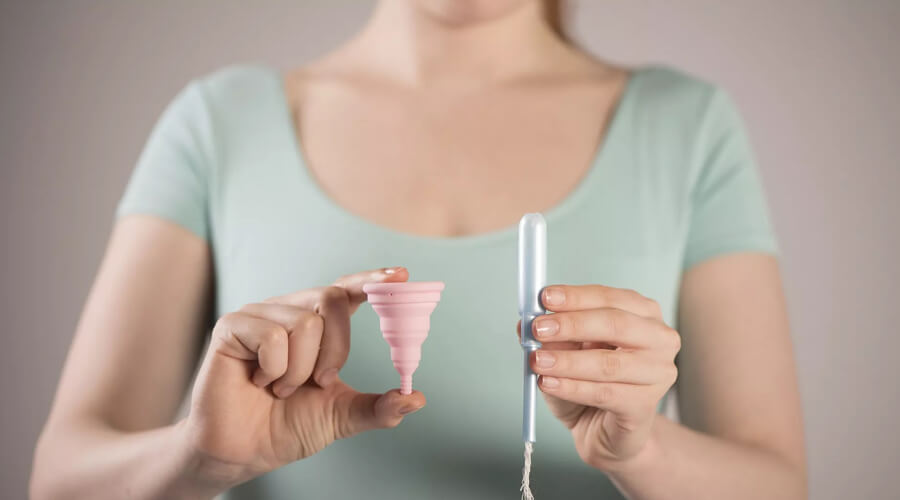
Pros and cons of using menstrual cups
Menstrual cups are growing popular these days, but do you really know what they are? They are silicon or rubber cups in the shape of a bell, which is folded and inserted in the vagina. Once inside the body, the cup opens and forms a vacuum seal alongside the vaginal walls and collects the menstrual liquid, until you remove the cup for emptying. The reasons for its popularity are many, with the most important factor being that they prevent menstrual leakage, a huge problem faced by women especially those with a heavy menstrual flow. It is reported to be very comfortable so much so that many women don’t even feel the presence of a cup when in use.
So, the next question is – Are they safe to use? We demystify the advantages and disadvantages of a menstrual cup.
The Advantages –
No Vaginal Infections:
Unlike tampons or sanitary napkins, the vagina doesn’t dry out while using menstrual cups. This means that the healthy bacteria
No TSS Linkage:
Usage of Tampons can lead to Toxic Shock Syndrome (TSS), a life-threating condition, whereas the risk of TSS with menstrual cups is virtually negligible.
Odour free:
The menstrual fluid when in contact with air has a foul odour which can pose a problem when using a napkin. This issue doesn’t exist if one uses a menstrual cup instead./p>
Change time is far less:
In the case of sanitary napkin or tampon, one would have to change it maybe every four hours or even less if the person has a really heavy flow. In the case of menstrual cups, one can empty the cup after eight hours, which is a big advantage especially when you are travelling.
No Chemicals:
While sanitary napkins and tampons consist of chemicals like dioxin and bleach that may cause allergic reactions for some, menstrual cups do not have any chemicals and are comparatively safer.
Reusable:
As opposed to menstrual comfort products like sanitary pads and tampons; menstrual cups are reusable and can be used for years together if they are washed, cleaned and maintained properly. It’s a good idea to invest in a good menstrual cup rather than spend on and keep stocking sanitary napkins or tampons every month. This option also makes it environment-friendly as they are reusable.
The Disadvantages –
Intervenes with Intrauterine Device:
Women who have inserted an intrauterine device (IUD) as a family planning measure, have the string of the IUD in the vagina. This string might be pulled down when one removes the cup and the IUD may get dislodged. To avoid this, contact your gynaecologist and get the length of the IUD string shortened.
Previous TSS or vaginal infection:
If you have encountered TSS previously or had any kind of vaginal infection it is risky to use the menstrual cup as in this small group risk of infection remains high.
Surgery or Child Birth:
Post miscarriage, childbirth or any kind of gynaecological surgery, it is not advisable to use the menstrual cup until fully healed, due to the risk of infection, as the blood is a good culture medium for bacteria.
Irritation:
This is not the best option if you are allergic to silicon, rubber or latex.
Fixing and removing it:
Women find it a little difficult to use the menstrual cup and it takes some practice until one can use it perfectly. Similarly, removing the menstrual cup isn’t easy initially. You have to squat and push the menstrual cup down using your pelvic muscles. Once you feel the cup you have to carefully remove it so that the fluid doesn’t spill.
Cleaning:
Although menstrual cup is very useful especially when you travel, women find it difficult or uncomfortable to clean it in public places. This can be tackled by using wipes or tissue inside the washroom and subsequently wash it.
Finally, weighing the pros and cons, if you have decided to use the menstrual cup, get in touch with your gynaecologist who can help you zero in on the right cup, as they do come in different sizes. There are many types of cups available and you can choose them based on your age, the flow or physical attributes like a lower cervix etc. Wish you a happy stress-free period.
Written By ~ Dr. Anagha Karkhanis – Senior Gynaecologist and Infertility Specialist and Director of Cocoon Fertility
Source: hellopost.in


